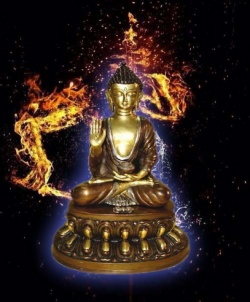Mahā-Brahmā
Mahābrahmā (‘Great Brahmā’). Buddhist name for the creator deity of the Hindu religion, as known to the Buddhists of the 6th cent. BCE.
According to the brahmans, the world was created by the Great Brahmā, and he was conceived of as a personal, masculine deity:
the ‘Great Brahmā’ (Mahābrahmā),
the ‘Supreme One’ (Abhibhū),
the ‘Unconquered’ (Anabhibhūto),
the ‘most Ancient’ (Vasī),
the ‘Father of all that are born and are to be born’ (Pitā-bhūtabhavyānaṃ), the ‘Steadfast’ (Nicco), the ‘Immutable’ (Dhuvo), the ‘Eternal’ (Sassato), and the ‘Unchangeable’ (Aviparināmadhammo).
The belief in a creator deity of such or any other description was not acceptable to Buddhism, as the world according to Buddhism is not the product of such creative activity, but of an on-going evolutionary process.
The Buddhist reinterpretation of the Hindu belief in the creator deity Mahābrahmā was designed not only to deny this belief, but also to build the case against it. </poem>
